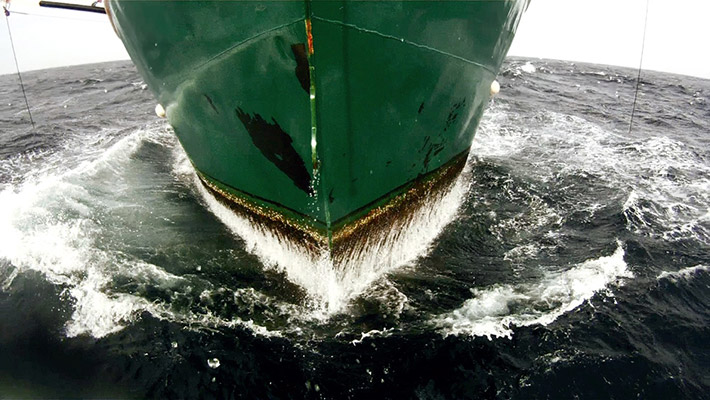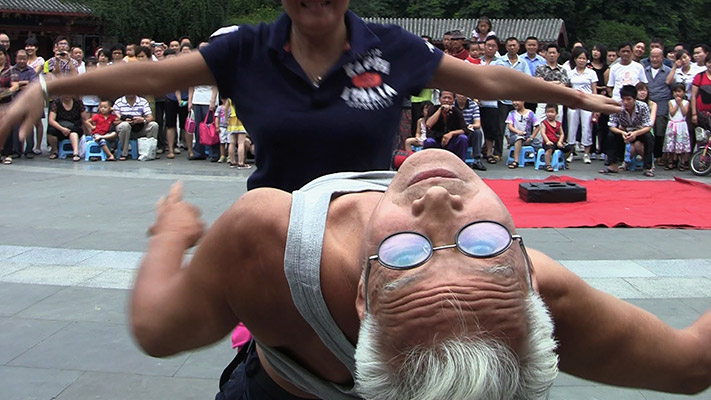Leviathan (2012), a dialogue-free documentary shot entirely aboard a fish trawler off the Massachusetts coast, is an incomparably immersive experience. With camera angles capturing everything from seagulls in flight to rushing water around the moving vessel to the last gasps of fish on the deck, the work can be “often unnerving and sometimes nauseating,” in the words of A. O. Scott, of The New York Times. Leviathan’s innovative, genre-defying cinematic approach has earned the film wide critical acclaim and rave reviews.
On July 31, viewers can experience Leviathan in the museums’ Menschel Hall, which boasts state-of-the-art audiovisual technology. It’s part of the museums’ Experiments with Cinema weekly summer series, presenting cutting-edge works rich in sound and picture from Harvard’s Sensory Ethnography Lab.
Designed to promote innovative combinations of aesthetics and ethnography, the lab is a supportive academic and institutional environment for Harvard students, anthropologists, and artists producing creative projects that test and respond to the traditions of documentary film. With filmmaker Lucien Castaing-Taylor as its director and Ernst Karel as its manager, the lab is closely associated with Harvard’s Film Study Center, which itself has a rich history of supporting experimental documentary filmmaking. The 10 works being featured over seven Sundays in July and August are all products of the lab. At many of the Sunday matinee programs, producers, directors, and other individuals involved with the lab will give introductory remarks and will participate in a conversation with the audience afterward.
“We are excited to highlight the remarkable works of the Sensory Ethnography Lab, an innovative space for the development of visual and acoustic media,” said Chris Molinski, the Rabb Curatorial Fellow in the Division of Academic and Public Programs. “This weekly Sunday series is a wonderful complement to some of the works currently on view in the museums, which offer unique depictions of landscape, time, and our relationship to the past.” Those concepts are evident in the special exhibition Everywhen: The Eternal Present in Indigenous Art from Australia, as well as in Ben Rivers’s nine-channel installation The Shape of Things (July 1–October 25, 2016), commissioned as a project for the museums’ Lightbox Gallery.
Other highlights in the series include the single-shot documentary People’s Park (2012), screening on August 21. Created by Libbie D. Cohn and J. P. Sniadecki, the film explores the many pockets of performance coexisting within the lived environment of a famous park in Chengdu, China, including waltzing couples, karaoke singers, and even cicadas.
Two surround-sound pieces being played on July 24—Ernst Karel’s Morning and Other Times (2014) and Swiss Mountain Transport Systems, Radio Edit (2011)—explore the vast potential of acoustic media. Morning and Other Times, a multichannel sound piece made from recordings in Chiang Mai, Thailand, is resonant with the noises of dogs, birds, insects, and other animals in the urban and para-urban environments. Swiss Mountain Transport Systems is an auditory investigation of the Swiss social-geographical landscape through various mobile transport systems, such as gondolas and funiculars.
Experiencing these sound works in the cinema is similar to listening to a concert, “but perhaps more interestingly, it’s a combination of that and the faculties we bring to cinema,” said Karel, who, besides managing the Sensory Ethnography Lab, is also a lecturer in anthropology, and assistant director of the Film Study Center. There’s less information provided by a sound piece than there is by a film or audiovisual presentation, Karel said, “but that’s what I find so interesting about it. It allows the listener the freedom to make their own sense of what they’re experiencing.”
That openness to interpretation is a clear strength shared by each work featured in the series, regardless of individual formats or approaches. For more information about each week’s Experiments with Cinema program, please visit our calendar.




